Public administration. Рубрика в журнале - Economic and Social Changes: Facts, Trends, Forecast
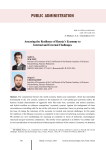
Assessing the resilience of Russia’s economy to internal and external challenges
Статья научная
The competition between the world economy leaders and contenders, which has intensified dramatically in the 21st century, resulted in the formation of a new global geo-economic reality. Its features include dissemination of aggressive tools like trade wars, secondary and tertiary sanctions, and hybrid conflicts to influence competitors’ economic systems. Against the background of these circumstances coinciding with the rise of the sixth wave of innovation, there is a growing need to study the issue of raising the resistance of the economy to internal and external challenges. In this paper the resilience of the Russian economy is considered in the context of achieving economic sovereignty. We develop our own methodology for assessing its condition in terms of industrial, technological, structural and geo-economic components. The novelty of our approach is as follows: we combine end-to-end consideration of external factors influencing the resilience of the country’s economy; we abandon thresholds in favor of comparing accounting periods with the baseline period, and use a floating scale of assessment. In order to avoid data subjectivization we use only transparent information and statistical materials from Rosstat, World Bank, WTO, OECD and other official institutions. The methodology was tested on the 2015-2022 time period, which made it possible to identify weak spots in the country’s economic resilience system and develop a three-stage strategy for strengthening it. The major task of the first stage is to design a set of measures to protect and support the most vulnerable industries and those affected by sanctions pressure on the principles of “reciprocal protectionism”; at the second stage we propose to launch a restructuring of the economic system based on “enlightened semi-isolationism”; at the third stage it is vital to shift to “reasonable protectionism” with the task of integrating the national economy into the sixth wave of innovation. The results obtained can be used by the authorities of the Russian Federation when developing and adjusting the counter-sanctions strategy.
Бесплатно
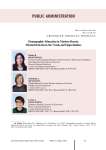
Demographic education in modern Russia: mismatch between the needs and opportunities
Статья научная
Negative trends in major demographic processes, aggravated by the impact of the COVID-19 pandemic, require not only an active demographic policy, but also thoughtful and well-grounded management decisions. This raises the requirements for the qualifications of employees in the field of science, education and management personnel in terms of their understanding of complex and multifactor demographic processes. Consequently, the need for training and retraining of demographers is also increasing. The purpose of the work is to assess the current state of demographic education in Russia and the possibilities of its development. The article presents an overview of foreign and national educational and scientific practice in the field of demographic education. We find that the “Demography” field is included in the enlarged group “3. Social sciences, business and law”; therefore, most educational institutions implement educational programs in the “Sociology” field; more often these are master’s degree programs. Scientific institutions focus on collaborating with educational institutions and pursue an educational and scientific trajectory (for example, the USA); they can also work autonomously by responding to the needs of the state and society (France, Germany). We also review Russian practice of implementing the educational process under the program “Demography”. We find out that only three universities conduct educational activities under this program. However, the scientific and educational potential for training demographers, taking into account “non-core” universities and academic research organizations, is available in the capital and in the regions. Nevertheless, the presence of laboratories specializing in demographic research proves the relevance of demographic knowledge in various regions of Russia. The analysis of departments’ teaching staff confirms their high educational and scientific potential. An overview of the work of scientific institutions and departments at universities indicates that vigorous scientific and research activity in the “Demography” field is being conducted in Russia. The analysis shows that in modern Russia, the issues of standardization of this area of work and education have not yet been fully worked out. We substantiate a system of successive stages for development of an educational standard in the “Demography” field and approval of the “Demographer” professional standard.
Бесплатно
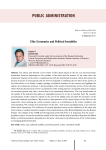
Elite economics and political instability
Статья научная
The article puts forward a new version of elite theory based on the use of a macroeconomic production function depending on the number of the elites and the masses. At the same time, the production function of the elites is complemented with the distribution function, which determines the income structure of social groups and the level of inequality. Combining the two sides of the activity of the elites allows us to design a simple typology of political situations in the country and highlight the regime of revolutionary situation. A formal analysis of the model of production activity of the elites has shown that the phenomenon of over-accumulation of the ruling class has a noticeable destructive impact on economic growth only after a severe drop in its functioning effectiveness. The very deterioration of the quality of the political elite allows an unjustified increase in its size to manifest itself. We consider generalizations of elite model in relation to the case of the middle class and show the invariance of the previously obtained conclusions. We provide an interpretation of the macro-theory of the elites for the mega-level, when studying the world economic system as a combination of the center, periphery and semi-periphery. We consider four dimensions of the elite, with system paradigms being a new element within these dimensions. The influence of external historical events on the worldview of the elites and their actions is revealed using the examples of the transformation of the Roman Republic into the Roman Empire, the collapse of the USSR and the beginning of the fall of the U.S. hegemony. For the center - periphery system, we test the production model of the elites with the help of statistical data from the World Bank; we build econometric dependencies that show a decrease in the effectiveness of the United States in managing global production.
Бесплатно
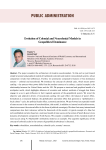
Evolution of colonial and neocolonial models in geopolitical dominance
Статья научная
The paper considers the architecture of modern neocolonialism. To this end we put forward simple structural and graphical models of traditional (colonial) and modern (neocolonial) systems, whose comparison reveals their differences. Further, we systematize comparative features of two dominance systems - colonial and neocolonial. We introduce the concept of colonial cycle, which means power castling - the process when power shifts from the mother country to its colony; a typical example is the relationship between the United States and the UK. We propose a structural and graphical model of a multipolar world, which highlights alliances of countries and indirect methods of struggle that States engage in so as to gain influence in their regional segments of the geopolitical system. We reveal the objective and subjective drivers of neocolonial castling: the scale effect; the balance of power effect, formalized as a structural balance; the globalization saturation effect that generates a “globalization / local culture” cycle; the political leader effect; economic patriotism. We put forward an expanded model of state success in the context of neocolonialism; this model, in addition to internal social achievements, takes into account the external effect in the form of political sovereignty. We show that many international comparisons lose their relevance within the framework of this model. A typical example of a false but well-established narrative based on a narrowed model of state success is the notion of South Korea's more dynamic development compared to North Korea. We consider a modification of the extended model of state success using N. Machiavelli's militaristic model as an example. The cognitive significance of the concept of colonial cycles in the context of geopolitical turbulence is discussed.
Бесплатно
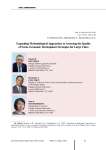
Статья научная
We substantiate areas of improving the tools designed to assess the quality of socio-economic development strategies for large cities. In particular, we developed and tested a methodology for assessing the quality of socio-economic development strategies for large cities based on the principles of strategic planning and social corporatism. At the first stage, it involves analyzing the dynamics of key indicators of socio-economic development in large cities, reflecting the growth rates of the number of city residents (“Citizens” indicator, provides a comprehensive assessment of the dynamics of development and targets of the urban community); the number of registered enterprises and organizations in the city (“Business” indicator, provides a comprehensive assessment of the dynamics of development and targets of the entrepreneurial community); the volume of housing construction (“Municipality” indicator, provides a comprehensive assessment of the effectiveness of municipal management through land use, interaction with residents and construction companies), as well as the faith of people and investors in the city and its future. At the second stage, we assess the use of five main mechanisms of social corporatism in the development strategies of large cities via contextual analysis: project management, urban sociology, territorial public self-government, municipal-private partnership, participatory budgeting. At each stage, we arrange large cities into groups in accordance with the criteria under consideration. At the final stage, we design a “Strategy - Development” matrix and put forward proposals for finalizing the strategies of large cities, taking into account their features. The approbation of the methodology has shown the heterogeneity of the quality of strategic planning and the dynamics of socio-economic development in Russia’s large cities. This may indicate that they are all at different stages of development of social corporatism. Therefore, it is necessary to use different approaches, tools and directions when developing city strategies, taking into account their characteristics and potential.
Бесплатно
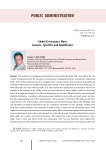
Global governance wars: Genesis, specifics and significance
Статья научная
The modern era of political confrontation in the second half of the 20th –first half of the 21st century is characterized by the transition to the doctrine of global governance wars between conflicting States. The essence of this doctrine is to strengthen one’s own governance system as much as possible and critically weaken the enemy’s public administration system so that all the links of the state body cease to work effectively and cope with their tasks. The paper reveals the significance of governance wars on the example of the collapse of the USSR, which occurred without any direct military clash, but led to the loss of all strategic advantages for the Russian Federation, its successor. We put forward a structural model of global dominance, according to which governance depends on hard, soft, and smart power; we show that this understanding comes from generalizing J. Nye’s concept of soft power. We define the specifics of governance wars: long duration, all-encompassing and uncompromising nature. The following tools and algorithms of modern governance wars are considered: promotion of own ideology; working with local elites; masks syndrome and conspiracy in political elites; control over the information space; color revolutions; proxy wars; destruction of medical sovereignty. We reveal the relationship between governance wars and governance cycles that imply fluctuations in the effectiveness of public administration system both within one country and between countries. We consider five levels of social phenomena: meta, mega, macro, meso and micro levels, and substantiate their two-way hierarchy, when higher-level processes determine the development vector for lower-level processes, and lower-level processes form the mechanisms for implementing higher-level processes. We show that in modern conditions this paradigm is gaining importance, preventing the formation of distorted cognitive patterns in relation to the driving forces of national development.
Бесплатно
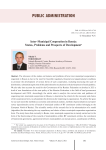
Inter-municipal cooperation in Russia: status, problems and prospects of development
Статья научная
The relevance of the studies on features and problems of how inter-municipal cooperation is organized in Russia is due to the need for favorable regulatory, financial and organizational conditions to promote the development of various forms of such cooperation, including increasing the scale of distribution, substantiating the role of this administrative mechanism in the development of municipalities. We also take into account the need for the Government of the Russian Federation to develop in 2021 a draft of new foundations of the state policy of the Russian Federation in the field of local government development until 2030. Accordingly, the article aims to analyze the current state and problems of organizing inter-municipal cooperation in Russia, to determine the criteria for the necessity and choice of the cooperation form, to substantiate the directions for improving its organization. To achieve the goal, we use such scientific methods as economic and statistical analysis, methods of generalization and expert survey (questionnaire survey of heads of municipal entities of RF constituent entities belonging to the European North of Russia). The scientific novelty of the research lies in the substantiation of a model (algorithm) for determining the very expediency and choice of inter-municipal cooperation organization form. The study shows that currently in Russia, inter-municipal cooperation is mainly carried out in the form of the functioning of the councils of municipalities within RF constituent entities, the conclusion of framework agreements, agreements between municipalities on mutual action, coordination of efforts, and implementation of joint activities. Only 2.8% of the total number of municipalities in the country participate in cooperation most closely (establishing inter-municipal organizations). We have developed appropriate recommendations to the authorities to eliminate the existing obstacles and problems in the development of inter-municipal cooperation. The results of the conducted research can be used in the activities of federal, regional public authorities, local government bodies, and serve as a basis for further research on improving local management system.
Бесплатно
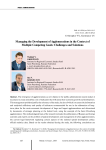
Managing agglomeration development in the face of multiple competing goals: challenges and solutions
Статья научная
The emergence of agglomerations as new objects in the public administration system makes it necessary to create and define a set of indicators that will assess their economic growth and development. This management problem justifies the relevance of the study, the aim of which is to assess the information and analytical sufficiency and quality of indicators recommended for use in the elaboration of longterm plans for the socio-economic development of large and largest agglomerations and determined by documents of strategic planning at the federal level, using the example of the Saint Petersburg agglomeration. The methodological basis of the research includes the publications of Russian and foreign scientists and experts on the problem of spatial development and management of urban agglomerations; the current legal framework regulating certain aspects of the national spatial development policy; official statistics data. Based on the results obtained during the study, the following conclusions are drawn: 1) indicators for assessing the economic growth of agglomerations, which are unambiguously defined by federal documents of strategic spatial planning, can be accepted as minimally sufficient and exclusively for the implementation of an extremely concise version of express analysis; 2) the process of institutionalization of urban agglomerations management has not been completed; at the current stage, we are dealing with a “soft” form of both requirements for determining the composition and boundaries of agglomerations and rules for the formation of long-term agglomerations development programs; 3) it is necessary to develop existing experience in creating strategic plans for the development of urban agglomerations. The new methodology should combine modern spatial development concepts that help to find a compromise between state control and the potential of agglomeration management; to overcome the problem of fragmentation of management and the blurring of the institutional structure of agglomeration management; to use the tools of quality economics (metrology, standardization and quality management) in the development of strategies and long-term plans for the development of urban agglomerations.
Бесплатно
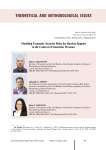
Modeling economic security risks for Russian regions in the context of sanctions pressure
Статья научная
The article investigates the problem of ensuring Russia's economic security in the conditions of increasing sanctions pressure. In order to assess and analyze emerging risks, we propose a multifactorial model that considers the economic security of Russian regions as a complex multidimensional system influenced by various interrelated risk factors. We use a list of indicators for monitoring and assessing Russia's economic security, approved by Presidential Decree 208, dated May 13, 2017. For the purpose of risk modeling, we establish two-level threshold values (“soft” and “hard”) of indicators based on expert assessment. The information base of the study includes data of the Federal State Statistics Service for Russia, as well as data in the context of constituent entities of the Ural Federal District by month for the period from January 2016 to March 2023. According to the calculation results, the aggravation of sanctions imposed by unfriendly countries has negatively affected the economic security of Russia as a whole and that of constituent entities of the Ural Federal District. Within the analyzed period, the risks created are significantly lower in comparison with the consequences of the COVID-19 pandemic, and they tend to decrease. Regional analysis shows that the most significant risk factor is the condition of agriculture, which has been significantly affected by the quarantine and sanctions restrictions imposed. Modeling economic security risks for Russian regions on the basis of the proposed approach in dynamics will help to promptly assess the current situation and put forward management recommendations in a timely manner, when economic security is compromised.
Бесплатно
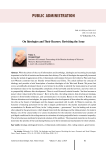
On ideologies and their bearers: revisiting the issue
Статья научная
With the advent of the era of information and knowledge, ideologies are becoming increasingly important in the life of societies and determine their history. The role of ideologies has especially increased during the period of aggravation of the civilizational confrontation between the Collective West and those non-Western countries that are friendly toward Russia and China. The article defines the concept of ideology and provides a brief description of modern ideologies of the West and Russia. We prove that even a scientifically developed theory is very limited in its ability to identify the main patterns of societal development (due to the incomparable complexity of the knowable and the knower), and even more so to purposefully influence this development. There is a well-known Leninist formula: “An idea becomes a power when it takes hold of the masses”. But it is the elite, the ruling stratum, that develops an ideology, protects it from hostile influences, and communicates it to society. Based on the works of Russian and Western historians and sociologists, the paper describes the development of ideas about the ruling stratum, the elite as the bearer of ideologies and the dangers associated with its split. In Western countries, the function of selecting personnel for the elite is largely performed by the market mechanism of capital accumulation. In Russia and China, in the “ruling stratum - government” tier, the leading role is more often played by the government, which largely forms both the ideology and the ruling stratum. In modern Russia, one of the crucial tasks is to create mechanisms for the selection of personnel and creation of privileged conditions for the ruling stratum in a situation of existing unjustified socio-economic inequality. The article discusses methods for practical solution of this problem. The presented material can be used to determine the priority of the tasks facing Russia and to form institutional mechanisms for their solution.
Бесплатно
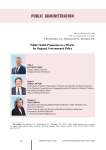
Public health promotion as a priority for regional governmental policy
Статья научная
The article reveals aspects of public health management at the regional and municipal levels. This is an urgent task due to the high potential of the regulatory impact of these levels of government on people’s well-being. The aim of the work is to substantiate our own approach to understanding public health management at the regional (and municipal) level and put forward a tool for assessing managerial influence. We review scientific literature on public health issues, as well as regional and municipal strategic and program documents in the field of preserving and strengthening public health. We also systematize the components of public health management in strategic planning and project management at the regional and municipal levels (on the example of the Vologda Oblast) and consider individual tools for promoting public health. In order to assess the effectiveness of development of municipal programs related to public health promotion, we work out a public health and well-being index and test it in two variations: to be used at the regional and municipal levels of government; this constitutes the scientific novelty of our study. We reveal key problems in assessing public health management and propose recommendations on their solution and improvement of methodological and informational tools.
Бесплатно
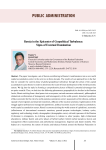
Russia in the epicenter of geopolitical turbulence: signs of eventual domination
Статья научная
The paper investigates a set of factors contributing to Russia’s transformation into a new world capital accumulation center in the next two to three decades. The novelty of our approach lies in the fact that we consider the current phase of global geopolitical turbulence through the prism of the capital accumulation cycles theory in order to determine the vector of future development of the world economic system. We dig into the topic by forming a comprehensive picture of Russia’s potential advantages that are quite versatile. Thus, we look into the following phenomena: geographical (ice decline in the Russian Arctic; Russia evolving from a land power into a sea power; natural resources endowment), philosophical (dialectical confrontation of homogeneity and heterogeneity of the world system), historical (syndrome of false contender for the role of a world capital accumulation center; passionarity of the ethnos), political (parade of sovereignties and imperial revanchists, diffusion of the nuclear syndrome, legitimization of the struggle against political and managerial opposition), political economy (cycles of capital accumulation; world capital accumulation center; Russia’s economy joining the world system of capitalism), economic (effectiveness of international economic sanctions; general-purpose technologies; industry cycles; regulatory and technology triads), demographic (demographic curse), cultural (openness of the Russian Civilization to immigrants, its civilizing experience in relation to other peoples, high civilizational absorption), military (latent and active phases of hybrid warfare; hybrid warfare paradox), factors and management effects (autonomous and authoritarian management, hegemon and leader models). This helped us to reconstruct the system of checks and balances formed around the Russian Federation in the hybrid warfare between the West and the Non-West. We deepen the analysis by providing our own interpretation of sea states and land states. The main conclusion of the research is that Russia possesses unique geopolitical advantages that allow it to successfully counteract the Collective West and eventually become a new leader of the world economic system.
Бесплатно
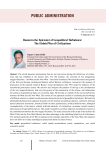
Russia in the epicenter of geopolitical turbulence: the hybrid war of civilizations
Статья научная
The article discusses mechanisms that are put into action during the hybrid war of civilizations that has unfolded at the present time. For this purpose, the concepts of two antagonistic megacivilizations - the West and the Non-West - have been introduced. We reveal the essence and genesis of the First and Second civilizational failures within Western civilization, reconstruct the anatomy of destruction of the national model of Russia’s social development after 1991 under the influence of the neocolonial governance system. We uncover and interpret the paradox of the lag in the development of the two megacivilizations, look into the genesis of the passionarity of the ethnos, and substantiate the primacy of geopolitical logic over economic logic. We provide an outlook of the current hybrid war between the West and the Non-West. The novelty of our approach consists in combining the knowledge of different sciences to explain social processes during the period of geopolitical turbulence. We look into philosophical phenomena (opposite dynamics of the material and spiritual spheres), cybernetic (full and partial cybernetic inversions), historical (birth of ethnic passionarity), political (hybrid wars), biological (neuroplasticity of the brain), cultural (cultural plasticity of civilization), economic (world currency, phenomenon of superprofits) factors. This made it possible to correlate objective and subjective factors in the confrontation between the two megacivilizations. The main conclusion of the study is that neither the West (USA) nor the Non-West (Russia) has clear advantages in the unfolding hybrid war of civilizations. The tactical superiority of the West is opposed to the strategic superiority of the Non-West; this situation does not allow us to make unambiguous predictions about the future winner.
Бесплатно
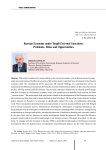
Russian economy under tough external sanctions: problems, risks and opportunities
Статья научная
The article examines key issues related to the current economic crisis in Russia caused by large-scale sanctions imposed by Western countries. We analyze main trends that have developed in the Russian economy after the introduction of the sanctions. We provide findings of a questionnaire survey of representatives of Russian enterprises, showing the reaction of domestic producers to the crisis phenomena of 2022. Having analyzed official statistics, sectoral and corporate information, we identify growth points that have emerged in the Russian economy under new conditions and describe main reasons for these “success stories”. We assess major risks and threats related to the development of the Russian economy in the medium and long term and propose methods to deal with them. We show that under dramatic foreign policy pressure on Russia, it is necessary to significantly expand the scope of mobilization (planning) tools. These mechanisms should provide a prompt solution to such structural problems as the full-fledged revival of key economic sectors, infrastructure development, elimination of regional imbalances, etc. Increasing the role of mobilization tools should be ensured by expanding public investment, strengthening protectionism in foreign trade policy, introducing elements of indicative planning and currency control; at the same time, the key function of market mechanisms should be preserved. We argue that Russia’s economy could make a powerful breakthrough in the modern context. This point is justified, on the one hand, by analogy with the situation in the late 1990s (a powerful breakthrough of the Russian economy immediately after the abandonment of inadequate macrofinancial policy), on the other hand, by the survey data of RAS Institute of Economic Forecasting on a sufficiently high modernization activity of Russian enterprises at the present time.
Бесплатно
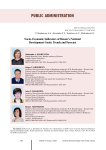
Socio-economic indicators of Russia’s national development goals: trends and forecast
Статья научная
The article presents the findings of a research on the achievability of a number of socio-economic indicators that are stated in the national development goals of Russia for the period up to 2030. The aim of the work is to analyze the possibility of achieving the indicators reflected in Russia’s national development goals by individual federal districts based on forecasting and creating an appropriate rating. The study includes three stages: first, to analyze available statistical data and select indicators for analysis; second, to build three forecast scenarios (pessimistic, neutral, optimistic); third, to visualize the results obtained and design a rating of federal districts according to the achievability of the declared parameters of development goals. Information base includes Rosstat data (statistical collections “Regions of Russia. Socio-economic indicators” for 2020-2023), as well as monitoring indicators of the minimum wage for the period from 2013 to 2024. We arrange federal districts in three groups: with a high level of achievability of indicators of national development goals (Central Federal District, North Caucasus Federal District), with a medium level (Northwestern Federal District, Southern Federal District, Ural Federal District, Volga Federal District) and with a low level (Siberian Federal District, Far Eastern Federal District). According to the forecast and the generalized rating, by 2030 none of the federal districts will be able to fully achieve the required level of the indicators under consideration. The uniqueness and novelty of the results we have obtained are due to the possibility of comparing the achievability of indicators in different time intervals and the declared values of Russia’s national development goals. The proposed rating can be vertically and horizontally scaled by expanding the number of analyzed indicators. The technique we propose and the results we have obtained can be used by representatives of all levels of legislative and executive authorities when assessing the declared socio-economic parameters of national development goals, including the implementation of other national projects, as well as by a wide range of scientists and researchers engaged in forecasting and modeling at the macro, meso and micro levels.
Бесплатно
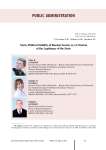
Socio-political Stability of Russian Society as a Criterion of the Legitimacy of the State
Статья научная
The paper uses the database of the all-Russian sociological monitoring “How are you, Russia?” to analyze the dynamics of socio-political stability of Russian society as a criterion and indicator of the legitimacy publicly expressed by citizens to the State, creating conditions for decent life in the present and future. By analyzing theoretical foundations of stability, we show the dialectical nature of sociopolitical stability, its predetermination by the nature of the social structure, distributive relations and the implementation of the principles of social justice in society. Based on the analysis of empirical information, we show the alienation of the majority of Russian citizens from the neoliberal government model, an expressed preference for choosing a socially oriented type of government, which leads to the people's demand for administrative socio-political management. The dynamics of satisfaction with the political system, the assessment by the population of the State's fulfillment of social, including constitutional guarantees, prove a high degree of stability of Russian society; however, this stability is based on only four factors: ethno-territorial; defense (trust in the Army); complete trust in the RF President (Vladimir Putin); social support of the population by the State, provided for in the Constitution. The factor analysis reveals the importance of various groups of contradictions in Russian society (economic, ethno-religious, class-related) that affect socio-political stability. We identify the sustainability risk zones associated with a low level of institutional trust in most government institutions and civil society structures. Based on the findings of the study, we put forward recommendations to strengthen the socio-political stability of Russian society and the State.
Бесплатно
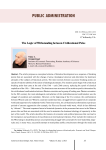
The logic of withstanding between civilizational poles
Статья научная
The article proposes a conceptual scheme of historical development as a sequence of breaking points that are associated with the change of sense, ideological structure and determine the dominant attitudes of the subjects of historical activity. The time intervals between successive breaking points are epochs of relative stability of the system of ideological attitudes. The modern epoch began with a historical breaking point that came at the end of the 19th - early 20th century, replacing the epoch of classical capitalism of the 15 th - 19th century. The dominant sense structure of the modern epoch is determined by the civilizational confrontation between Western countries and a group of leading non-Western countries. In the 20th century, the main ideological contradiction of this multidimensional confrontation was the struggle of socialism and capitalism. However, at the beginning of the 21st century, the confrontation between Western and non-Western countries transformed into a struggle between supporters of a unipolar world and supporters of a multipolar world. From time to time, the civilizational confrontation experiences periods of extreme aggravation (for example, the First and Second world wars), which is then followed by “detente”. The most important factor in historical dynamics is the processes that occur in the Western power elite and that are associated with the need to maintain the dominant ideology of superiority in this part of the world. The article describes the features of economic and political processes that can lead to the emergence and acceleration of exacerbations in international relations. They include the tendency of the West losing its leadership and an uncompromising struggle with contenders for new leadership; large-scale and, in many ways, successful attempts to manipulate public consciousness through the media and the education system; emergence of powers behind the throne in Western countries; revival of neo-Nazi organizations.
Бесплатно
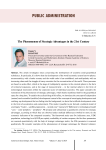
The phenomenon of strategic advantages in the 21st century
Статья научная
The article investigates issues concerning the development of countries amid geopolitical turbulence. In particular, it is shown that the development of the world economic system has two phases: monocentricity, with a leader country and the world order it has established; and multipolarity with an increasing chaos and the struggle of many countries for the reconstruction of the world. These processes are based on scale effect, which at the stage of multipolarity operates in the external sphere in the form of territorial expansion, and at the stage of monocentricity - in the internal sphere in the form of technological innovations within the corporate sector of individual countries. The paper considers the restoration of the phenomenon of strategic advantages, which barely manifested itself in the geopolitical space for a long time. To explain the cyclical rising of this effect, we introduce the concepts of independent (natural) and controlled (artificial) development instead of the concepts of outstripping development and catching-up development that are fading into the background; we show that artificial development exists in the form of acceleration and containment. This made it possible to put forward a political model of sovereignty “leader - satellites/opponents - neutral zone” instead of I. Wallerstein’s technological model “core - semi-periphery - periphery”. We propose and substantiate a quantitative criterion for strategic advantages, according to which they are observed under multiple differences (twofold or more) in the economic indicators of the compared countries. The framework study uses five indicators: area, GDP, population, technology level (GDP per capita), availability of nuclear weapons; the first four parameters are assessed quantitatively with the help of strategic advantages index; the fifth parameter is assessed qualitatively. We consider examples of the phenomenon of strategic advantages for bilateral relations: Azerbaijan/Armenia; Russia/Ukraine; South Korea/North Korea; India/Pakistan, etc. We also reveal the significance of this effect for Russia’s long-term foreign policy strategy.
Бесплатно
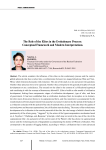
The role of the elites in the evolutionary process: conceptual framework and modern interpretations
Статья научная
The article considers the influence of the elites on the evolutionary process and the current global upheavals that have evolved into a confrontation between two megacivilizations (West and NonWest), which threatens humanity with extinction. The aim of the study is to try and answer the questions whether these processes were to be expected; whether they correspond to the general principles of social development or are a coincidence. The research on the elites in the context of a civilizational approach and combining it with the concept of democracy allowed D. Zolo to build an elite model of civilization development, linking three components: stages of civilization development, type of elite, and form of government. It has been established that as civilization develops (from its inception to its demise), the elite moves from power forces to its supranational form, and this movement is accompanied by the transformation of forms ofgovernment from anarchy to tyranny. It is shown that the period of the heyday of a civilization coincides with the period of the rule of national elites; as soon as the elite loses the quality of national power and becomes supranational, the civilization starts declining. The source of the evolutionary development of a civilization is the creative potential of the elite, the vital energy of which is found in the passionarity of the ethnic group, “triggered” by the action of the hypercompensation mechanism based on A. Toynbee’s “Chahenge-and-Response” principle, which may not work in the case of the rule of the supranational elite. An assessment of the current state of the Western elite has shown its supranational nature and the worsening process of degradation accompanying the decline of Western civilization. This corresponds to the paradox of lagging behind, according to which a civilization that is more advanced in terms of technological development finds itself in a state of spiritual crisis and disintegration earlier. From this point of view, the unfolding confrontation is a clash between the supranational elite and its national opponents, who defend the traditional values and interests of their own countries. The novelty of the research lies in the construction of an elite model of the development of civilization, and in the consideration of a structural model of an evolutionary leap in the case of the rule of supranational elites.
Бесплатно
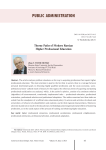
Thorny paths of modern Russian higher professional education
Статья научная
The article analyzes problem situations on the way to acquiring professions that require higher professional education. The main attention is paid to the fact that in society there is a real gap between personal (individual) goals in obtaining highly qualified professions and the socio-economic, socio-political and socio-cultural needs of society. In this regard, the reference points of acquiring and passing professional socialization are analyzed, which, in the author's opinion, consists of a consistent solution (algorithm) of interconnected, consistently implemented tasks – professional education, professional orientation, professional selection and professional adaptation. The author examines how these tasks are solved from the standpoint of: a) official state educational policy; b) actions and activities of schools and universities; c) behavior of schoolchildren and students; and d) their regional characteristics. Moreover, attention is paid not so much to the educational, methodological and organizational problems of mastering professions, as to the social aspects of the process of training and obtaining higher education
Бесплатно

